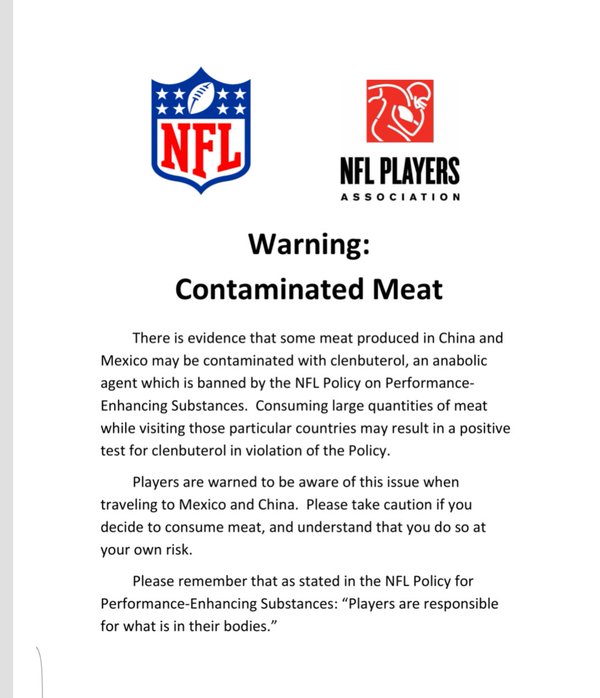I love the taste of beef from Mexico. But a recent warning from the National Football League brings up the legitimate question about the drugs used in cattle that cross over and are found in people.
Duane Brown, a player for the Houston Texans, tested positive for Clenbuterol after spending an off-week in Mexico. Clenbuterol is banned by the NFL, the International Olympic Committee, the USDA, and the FDA because of its use as a performance enhancing drug (PED). It is not a steroid, but works similar to anabolic steroids, but is more similar to ephedrine. Brown did some research and found that Clenbuterol is used by some cattle growers in Mexico, even though it is illegal. Brown appealed his ten game suspension, and the NFL investigated and found that Clenbuterol has been found in Mexican beef.
Mexican soccer players tested positive for Clenbuterol in 2011, and it was traced to Mexican beef. Three-time Tour de France champion, Alberto Contador was temporarily suspended after testing positive for clenbuterol in 2010. The suspension was overturned, and the World Anti-Doping Agency (WADA) found low levels in Contador’s body. He was the first to use the defense that he consumed steak contaminated with clenbuterol. Contador was stripped of his title and suspended for two years. He maintained innocence but the panel noted:
“In the panel’s opinion, on the basis of the evidence adduced, the presence of clenbuterol was more likely caused by ingestion of a contaminated food supplement.”
While the use of clenbuterol is banned in Mexico, it has still widely used for cattle. Its use The use is not benign to people. In February of 2009 70 people in Guangdong providence in southeast China suffered from clenbuterol food poisoning from pigs. More recently 13 people became ill near Hong Kong.
Mexican Beef Is This A Concern?
It is enough of a concern that I won’t be eating beef in Mexico again. Symptoms of diarrhea and stomach cramps that are often assumed to be secondary to bugs (bacteria such as salmonella, virus such as norovirus, or parasites)s may be secondary to contamination from clenbuterol.
Because clenbuterol is like ephedra, it may cause a rise in blood pressure, rapid heart rate, heart attacks especially in those who are prone to such things. Even in young healthy people this is a high risk.
The widespread use of clenbuterol in China led to a crackdown in the pork industry.
Clenbuterol cannot be inactivated down by cooking.
What About American Beef?
Clenbuterol is banned in food production in the United States and there has been no cases of this drug found. Hormones are used in raising of cattle in the United States. This has caused concern for some but the amount of the drugs are highly regulated. For example a 200 mg pellet implanted under the skin of the ear of cattle dissolves over the course of a year. The dose is smaller, per weight, than the similar dose of steroids given to post-menopausal women. When tested, the variability of hormones in cattle is within the normal range for the animal. Of note, steroid hormones are broken down by heat of cooking, where clenbuterol is not.
The advantage of hormone use in beef is allowing the cattle to come to market sooner, thus reducing the environmental impact of beef. There is no danger to humans from the hormones used in United States cattle.
Clenbuterol Symptoms and Use
Symptoms of the drug include heart palpitations, nervousness, nausea, fevers, chills, muscle tremors, and nervousness. It leads to a rise in blood pressure, heart rate, and can lead to a heart attack. Long-term use has been associated with malignant tumors.
Clenbuterol is used in some countries as a drug for asthma, but it is not licensed for use in the United States. Clenbuterol is sold on the black market, as it does increase fat burning and muscle growth (useful for animals and the animals in the gym).


